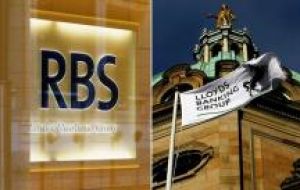MercoPress. South Atlantic News Agency
Major restructure of British banks includes more injection of funds
 Lloyds and RBS will be receiving a total of £ 39.2 billion of government funds
Lloyds and RBS will be receiving a total of £ 39.2 billion of government funds Britain’s Chancellor of the Exchequer Alistair Darling welcomed Tuesday the announcements that Royal Bank of Scotland (RBS) and Lloyds Banking Group are to sell off hundreds of branches.
The chancellor said the sales, which had been demanded by the European Commission, were in the “best interest” of the wider UK banking sector. The government also announced that it would be putting up to a further £39.2 billion into the two banks.
RBS is to get up to £33.5 billon, while Lloyds is to receive £5.7 billion.
The chancellor told the House of Commons that the developments would benefit the two banks, their customers, and taxpayers.
“We are creating a strong and vibrant financial services sector for the future,” he added.
However, the Tories say there is no guarantee the move will get credit flowing again.
In addition to the sale of RBS branches in England and Wales - originally Williams & Glyn's - RBS will sell its NatWest brand in Scotland, RBS Insurance and Global Merchant Services, its card payment business.
The total disposal will be 318 branches in the UK, or 14% of the RBS retail network.
The bank will also sell its stake in commodities trader RBS Sempra Commodities.
Lloyds will sell at least 600 branches, or about 4.6% of the total market of UK current accounts. That includes Lloyds TSB in Scotland along with some branches in England and Wales and mortgage broker Cheltenham & Gloucester, as well as the Intelligent Finance online business.
Lloyds says the businesses that it will have to sell off account for about £30 billion of customer deposits and £70 billion of lending, generating income of £1.4 billion in the year to December 2008.
The BBC's business editor, Robert Peston, said the “forced fragmentation” of UK banks was a priority of outgoing European Competition Commissioner Neelie Kroes.
But Mr Darling insisted earlier on Tuesday that the government wanted the break-up to happen.
“We were very clear with the Commission that we didn't want to see the banks move pieces around a board,” he said. “I would like to see perhaps three new entrants to the High Street.”
Names such as German insurance giant Allianz, Generali and Zurich are being mentioned as potential acquirers for the branches sold by RBS and Lloyds, said Douglas Fraser, BBC Scotland's business editor.
Shadow chancellor George Osborne responded to the announcement by saying: “Let's not miss the elephant in the room.
”The government has to put another £39.2 billion of taxpayers' money into the banks - a bigger bail-out than the original bail-out last autumn. Yet still there is no guarantee that it will get credit flowing in the economy.”
Lloyds, which is 43.5% owned by the government, also confirmed it would stay out of a government-run insurance scheme and would instead raise £21 billion, including a £13.5 billion rights issue. As part of this rights issue, the government is to buy £5.7 billion worth of additional Lloyds’ shares to maintain its shareholding at 43.5%.
At the same time, Lloyds will pay the UK government £2.5 billion to avoid joining the Government Asset Protection Scheme (Gaps), which provides state insurance for past toxic loans - bad debts it may not be able to recover.
The payment is to cover the “implicit protection” provided by the government since it first offered to insure Lloyds' book in February.
RBS, meanwhile, has confirmed it will put £282 billion of its assets into the scheme on revised - and more expensive - terms. As a result, the UK government's stake in the troubled banking giant will rise to 84%, though the Treasury said its ordinary shareholding would not exceed 75%.
RBS, which will be the only bank in the scheme, will also get a further capital injection of £25.5 billion from the government agreed in February. The government is also putting aside a further £8 billion to support RBS should its financial position deteriorate.
Under Gaps, the government insures - for a price - some of the expected future losses on past investments made by our banks.
If those losses crystallised, some of them would in effect be transferred to the taxpayer.
However, if they did not, the taxpayer might make a profit on the premiums that the government would have charged.
RBS will pay the UK government £700 million a year to be in the scheme and £2.5 billion to exit the scheme, if and when that happens.
Both banks have also agreed not to pay any cash bonuses to staff earning more than £39,000 for their performance in 2009, while board members will defer all their bonus payments for this year until 2012. But compensation could come in the form of shares in subsequent years. Robert Peston suggested the Treasury had now become, in effect, the biggest hedge fund in the UK.
As part of the latest agreement with the UK government, both RBS and Lloyds have also agreed to increase lending to businesses and property owners by a total of £39 billion. Separately on Tuesday, Lloyds said it had a “good revenue performance” in the three months until the end of September, but it still expects to report a full-year loss” (BBC).-




Top Comments
Disclaimer & comment rulesCommenting for this story is now closed.
If you have a Facebook account, become a fan and comment on our Facebook Page!